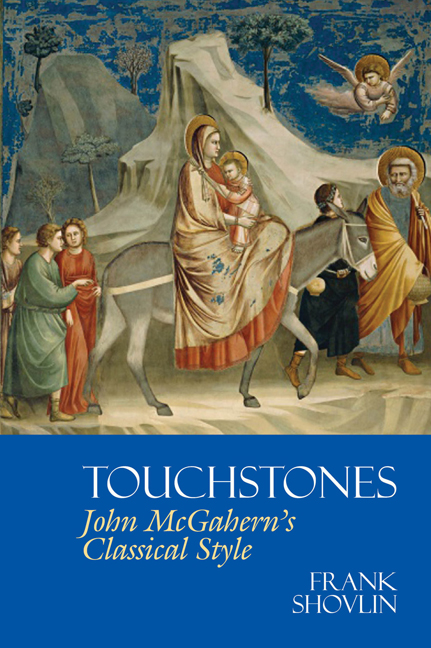Book contents
- Frontmatter
- Dedication
- Epigraph
- Contents
- Acknowledgements
- Touching Stones: Matthew Arnold and the Canon
- 1 We Other Clerks: James Joyce and the Classical Temper
- 2 A Walking Mirror: Stendhal, Horace, Nietzsche
- 3 One Lone Paperback: Tolstoy and Religious Sensibility
- 4 Magic: The Centrality of W. B. Yeats
- 5 Instinct: Douglas Stewart and Sex
- 6 The Fume of Muscatel: Yeats's Ghosts
- 7 Bohemian Rhapsody: Patrick Kavanagh and Generation X
- 8 Absurdity: Camus Comes to Clones
- 9 Aristocracy: Andrew Marvell, W. B. Yeats and the Curse of Cromwell
- 10 The Consolations of Nothingness: William Blake, W. B. Yeats and Prayer
- 11 Deliberate Happiness: W. B. Yeats and the Inner Life
- 12 Stranger in Paradise: Dante and Epic Style
- Conclusion: What Then?
- Bibliography
- Index
9 - Aristocracy: Andrew Marvell, W. B. Yeats and the Curse of Cromwell
from Touching Stones: Matthew Arnold and the Canon
- Frontmatter
- Dedication
- Epigraph
- Contents
- Acknowledgements
- Touching Stones: Matthew Arnold and the Canon
- 1 We Other Clerks: James Joyce and the Classical Temper
- 2 A Walking Mirror: Stendhal, Horace, Nietzsche
- 3 One Lone Paperback: Tolstoy and Religious Sensibility
- 4 Magic: The Centrality of W. B. Yeats
- 5 Instinct: Douglas Stewart and Sex
- 6 The Fume of Muscatel: Yeats's Ghosts
- 7 Bohemian Rhapsody: Patrick Kavanagh and Generation X
- 8 Absurdity: Camus Comes to Clones
- 9 Aristocracy: Andrew Marvell, W. B. Yeats and the Curse of Cromwell
- 10 The Consolations of Nothingness: William Blake, W. B. Yeats and Prayer
- 11 Deliberate Happiness: W. B. Yeats and the Inner Life
- 12 Stranger in Paradise: Dante and Epic Style
- Conclusion: What Then?
- Bibliography
- Index
Summary
No Scene that turns with Engines strange
Does oftner then these Meadows change,
For when the Sun the Grass hath vext,
The tawny Mowers enter next;
Who seem like Israaliies to be,
Walking on foot through a green Sea.
To them the Grassy Deeps divide,
And crowd a Lane to either Side.
With whistling Sithe, and Elbow strong,
These Massacre the Grass along:
While one, unknowing, carves the Rail,
Whose yet unfeather'd Quils her fail.
The Edge all bloody from its Breast
He draws, and does his stroke detest;
Fearing the Flesh untimely mow'd
To him a Fate as black forebode.
Andrew Marvell, Upon Appleton HouseJust before the death of his mother, when he was aged nine, John McGahern and his siblings were moved from the small house that they had shared with her in Aughawillan, County Leitrim and into the garda barracks at Cootehall, County Roscommon, home and workplace of their father. That move, the breaking apart of the beds with hammers to get them out of the house, the loading of the truck for the trip to Cootehall, troubles the heart of both The Leavetaking and of Memoir. That small crossroads village on the river Boyle was to be McGahern's home until he left it as a young man for Dublin and St Patrick's teacher training college. The barracks in which he lived became one of the most important and fertile wellsprings of his imagination and gave the title and location for his first published novel. He describes it thus in Memoir: ‘Below the bridge was the barracks and the large barrack garden. An avenue with a single line of sycamores ran from the road to the barracks and continued under the high stone archway before climbing between the thick banks of laurel to Lenihan's Bawn’.
Cootehall takes its name from the residence of a notorious Cromwellian general and settler, Chidley Coote. The young McGahern, living next to the still extant ceremonial archway leading into the long ago ruined home of Coote, could not but have been intrigued by the history of the place and the provenance of its name. ‘All that remained of Chidley Coote's old castle’, he remembers, ‘was a corner tower where the Cannons lived between the Finans and the Lenihans.
- Type
- Chapter
- Information
- Touchstones: John McGahern’s Classical Style , pp. 123 - 134Publisher: Liverpool University PressPrint publication year: 2016



